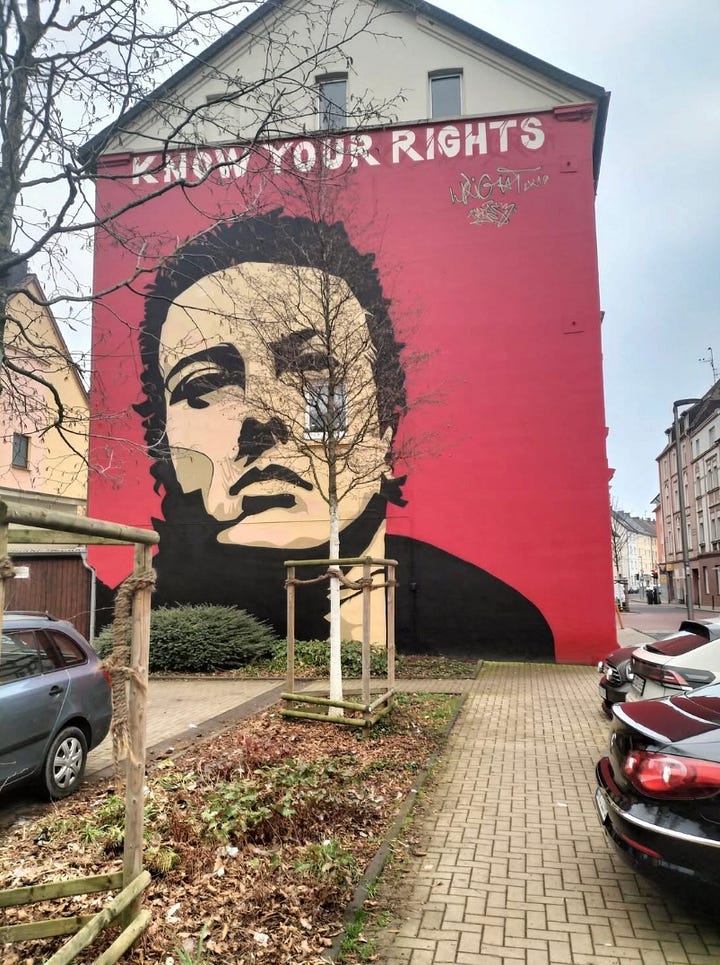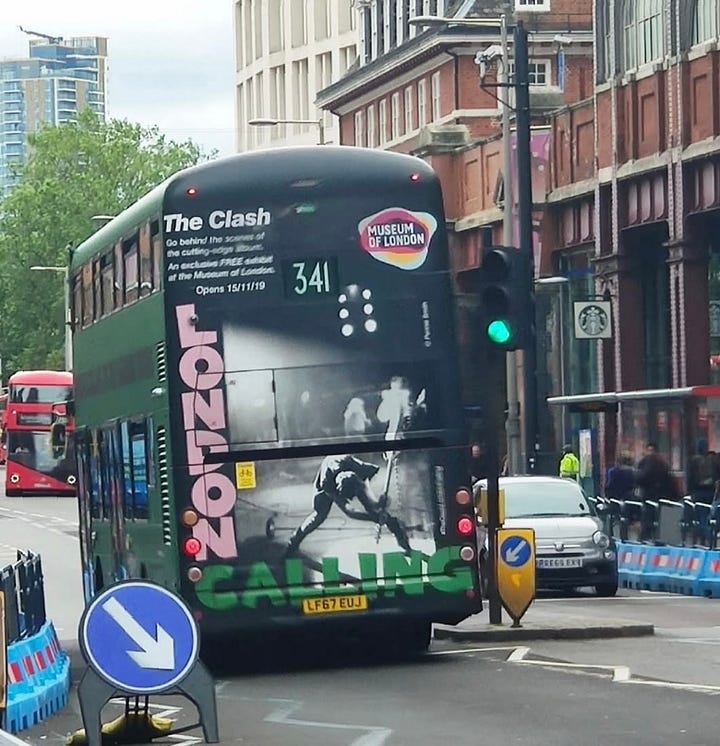Say it ain't so, Joe
The late Joe Strummer of The Clash would have so much to say
While the headline — “Say it ain’t so, Joe” — was actually supposedly uttered by a disappointed Chicago White Sox fan upon learning that his hero, Shoeless Joe Jackson had taken part in the fix of the 1919 World Series, it also applies to the situation in our world today — ideal fodder for a pen and guitar-fired-in-hell, Joe Strummer of the perfectly named band The Clash.
Clash with the world at large was exactly that their name said and what Strummer as the principal songwriter and singer made it a point to do on at least their first five extraordinary albums, “The Clash” and “Give ‘em Enough Rope” and “London Calling” and “Sandinista” and “Combat Rock.”
“Let fury have the hour, anger can be power, did you know that you can use it” he sang on “Clampdown” on “London Calling” and gee whiz, is there a better time in the recent history of the world for us to be furious about, well, everything?


We lost Joe just a few days before Christmas in 2002, December 22. The Clash had broken up many years earlier and Joe kept recording and writing but couldn’t quite match the unmistakable power of The Clash. But considering the way things have turned in our world and since all the other members are still alive (and, judging from the post-Clash movies, really regretful they didn’t treasure their time with the band more), it wouldn’t be like Joe didn’t have enough to write about and maybe getting the band back together for one last hurrah.
In their heyday, their advertising slogan — which also happened to be true — was “The only band that mattered.” And while there certainly other important bands and singers around, The Clash seemed to be one group that had a broader world view than anyone else.
His father, Ronald Mellor had an MBE (Most Excellent Order of The British Empire) for his work with the British government and his son, John was born in Turkey. He grew up going from boarding school to boarding school, learning first-hand about oppression and studying the history of The British Empire and in recognizing the social issues paralyzing England at that time, he had plenty to write about once he formed The Clash in 1976.
That first album, “The Clash” just burns from start to finish with songs like “White Riot” and “Remote Control” and “Janie Jones” and “Hate and War” and “I’m So Bored With the USA.” Fearlessly, they took on England’s social repression, police brutality, unemployment, racism, militarism… There was a genuine anger in their music — The Clash was a perfect name, that’s exactly what they sounded like. Strummer’s rough, intense vocals, guitarist Mick Jones’ ear for melody along with bassist Paul Simonon, who first looked the part, then learned how to play bass and drummers Terry Chimes, then Topper Headon all produced an edgy, raucous sound that was the antithesis of easy listening, tuneful stuff. It was a Clash, indeed.
Along with The Sex Pistols, they were the most significant band to come out of England’s punk movement. The Sex Pistols had just one killer album, “Never Mind The Bollocks” and broke up soon after. So in large part, The Clash had the field to themselves and Joe never missed an opportunity to raise the stakes with every album.
To me, “London Calling” is the best of the lot, a double album they wrote when they felt they were on the verge of being of being canned by the record company. There’s a desperation, a sense of “Here’s the last things we’ve got to say before you kick us out” to the record which never stops exploding in your face — their intent.
I was lucky enough to catch them for the first time on that 1980 tour and saw first-hand the fire, the damn-the-torpedoes spirit that infused them on stage. It was so loud in Boston’s Orpheum Theater that night, I actually stuffed tissue paper in my ears. But it was worth every note. What a show!
Seeing the mess the world is in, Ukraine, Gaza, Russia, not to mention the ridiculous behavior of our con man President, attempting to sell us crypto, sneakers, Bibles, rewriting our history with an astonishing, deeply troubling ignorance of history “Slavery was no big deal…they guarded the airports during the Revolution…Frederick Douglass is doing a great job…” not to mention ignoring and attempting to reconfigure the importance and significance of our Constitution and what the framers of Democracy (with a capital D) envisioned. Hey, if Strummer was bored with the USA before, he wouldn’t be now. What if he heard Trump say slavery was no big deal?
Sadly, there is no one to pick up the Strummer torch. Bob Dylan, at 84, isn’t about to dignify this political cesspool with a comment, much less a protest song or two. He dropped that sort of thing in 1963. Neil Young has done some work in this area and may continue to, somewhat subversively. Bruce Springsteen has been perhaps the most vocal about Trump and his obvious plan to turn back our democracy (with a small d). But in such a divided time, he’s most likely just reinforced his fans and alienated others.
Where The Clash and Strummer, in particular, were so brilliant is that they took on issues where party, generally speaking, didn’t matter. They worked above party affiliations or past them. And they challenged their audience in a way that was equal parts exciting, authentic and revolutionary. Or at least that’s how it felt.
Whether their music actually went and changed anything in our world, well, that’s hard to determine. But at least they weren’t afraid to say it, record sales be damned.
Like on “Four Horsemen” from “London Calling,” a song directed AT their audience like a pistol shot:
“But you! You're not searching, are you now? You're not looking anyhow. You're never gonna ride that lonely mile or put yourself up on trial. Oh, you told me how your life was so bad. An' I agree that it does seem sad. But that's the price that you gotta pay if you're lazing all around all day. Four horsemen coming right through. Four horsemen and they're pissing by you. They make you look like you're wearing a truss. Four horsemen and it's gonna be us.”
And for a while, not long enough, evidently, it was “us” — The Clash. They were for justice, for fair play, for a world where everybody mattered. Which is why when they came up with the slogan, “The only band that mattered” it wasn’t false advertising or hype. That’s how they felt and to those of us who listened, that’s how we felt, too.


Was lucky enough to see the Clash on their first two shows in Toronto. The first ended with hardcore punk fans crashing the stage in a pretty fitting finale. The second finished with fans tearing up sets and throwing them towards the stage of a stodgy establishment theatre, a venue that might have suited Tony Bennett but not the Clash. The Clash tapped into their fans’ anger — but not necessarily at a polemical or explicitly political level. I respect and agree with Springsteen but not even in his 20s did he provoke a reaction from fans that the Clash did, and really it was all Joe. FWIW I love JS’s work with the Mescaleros — I think it laps Combat Rock. And I think the Clash’s creative peak might have been their work off LP—their Cost of Living EP is my fave, songs that didn’t make it to an album. This is the set from the second show in Toronto. (Forgotten that it was my 23rd birthday.)
https://youtu.be/AylhNYhHYvY?si=bUJHH7zt-UFDFSDS